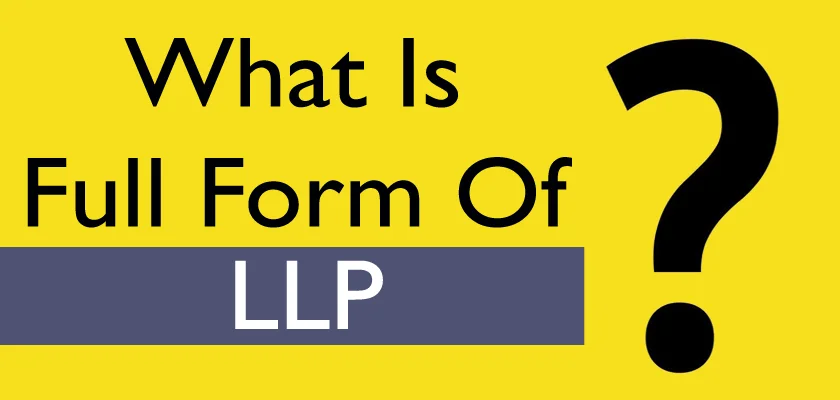Do you know what is the LLP Full Form? The Limited Liability Partnership (LLP) is a form of business entity that combines aspects of a partnership and a limited liability company. It provides the benefits of limited liability to its partners while allowing them to participate in business management. This article will explore the characteristics, benefits, and formation of a Limited Liability Partnership.
Table of Contents
What is the LLP Full Form?
LLP Full From – Limited Liability Partnership
What is LLP?
LLP stands for “Limited Liability Partnership.” It is a business structure providing a hybrid entity where the partners have limited liability, similar to shareholders in a corporation, while still enjoying the flexibility and tax benefits of a traditional partnership.
Characteristics of LLP
- Limited Liability: An LLP’s key feature is its little liability protection to its partners. This means that the personal assets of individual partners are safeguarded from the debts and liabilities of the LLP. Each partner is responsible only for their own actions and misconduct.
- Separate Legal Entity: An LLP is considered a separate legal entity from its partners. It can enter into contracts, hold property, sue or be sued, and conduct business in its own name. This ensures that the LLP’s obligations and liabilities are distinct from those of its partners.
- Flexibility and Simplicity: LLPs provide a flexible structure that allows partners to determine the internal management and operations of the entity based on mutual agreement. The LLP Agreement outlines the rights and responsibilities of partners, profit-sharing arrangements, and other crucial aspects of the partnership.
- Perpetual Succession: Unlike traditional partnerships, LLPs have perpetual succession. This means that a partner’s death, retirement, or exit does not affect the existence of the LLP. The LLP can continue its operations and admit new partners per the LLP Agreement’s provisions.

Formation of Limited Liability Partnership
Eligibility and Requirements to Form an LLP
LLP formation requires a minimum of two partners, and there is no maximum limit on the number of partners. The partners can be individuals, companies, or LLPs. There is no minimum capital requirement.
Incorporation Process
LLP formation includes registration, obtaining a digital signature certificate, and filing the necessary documents with the Registrar of Companies. Incorporation of LLP typically takes two to four weeks, depending on the state.
Memorandum and Articles of Association
Like other business entities, the LLP requires a Memorandum and Articles of Association. The MOA and AOA outline the business’s objectives, the partners’ rights and duties, and the internal management structure.
Benefits of LLP
- Limited Liability: An LLP’s primary advantage is its little liability protection. Partners are shielded from personal financial liability beyond their capital contribution, protecting their personal assets in case of business debts or legal disputes.
- Flexibility in Management: LLPs provide flexibility in management structure, allowing partners to define their roles, responsibilities, and profit-sharing arrangements per their agreement. This enables efficient decision-making and smooth operation of the business.
- Taxation Benefits: LLPs enjoy the benefit of pass-through taxation, where profits or losses are passed directly to the partners. The LLP is not subject to income tax, reducing the tax burden on the business and avoiding double taxation.
- Credibility and Transparency: By registering as an LLP, businesses gain credibility and transparency in the eyes of clients, suppliers, and other stakeholders. The legal recognition of LLPs provides a professional image and enhances the trust factor associated with the business.
Conclusion
A Limited Liability Partnership (LLP) is a unique business structure that combines the advantages of limited liability and partnership flexibility. Its full form, Limited Liability Partnership, highlights protecting partners’ personal assets while ensuring a simplified management structure and tax benefits. Entrepreneurs and professionals can establish a credible and transparent business entity that promotes growth and minimizes personal risk by choosing LLP.
FAQs – What Is The LLP Full Form?
What is the LLP Full Form?
The LLP Full Form stands for “Limited Liability Partnership.”
What is a Limited Liability Partnership?
A Limited Liability Partnership (LLP) is a legal business structure that combines the features of a partnership and a corporation. It offers limited liability protection to its partners, similar to shareholders in a corporation.
What are the advantages of LLP?
The advantages of LLP include limited liability protection for partners, flexibility in management and operations, pass-through taxation, and enhanced credibility and transparency for the business.
How does limited liability work in an LLP?
Limited liability in an LLP means that partners are not personally responsible for the debts and liabilities of the partnership. Their personal assets are protected, and they are only liable to the extent of their capital contribution.
Is an LLP a separate legal entity?
Yes, an LLP is considered a separate legal entity distinct from its partners. It can enter into contracts, hold property, sue or be sued, and conduct business in its own name.
How is an LLP managed?
The management and operations of an LLP are defined in the LLP Agreement, which outlines the partners’ rights, responsibilities, and profit-sharing arrangements. It provides flexibility in determining the internal management structure.
Is an LLP subject to income tax?
LLPs benefit from pass-through taxation, where profits or losses are passed directly to the partners. The LLP itself is not subject to income tax, avoiding double taxation.
Are there any requirements for registering an LLP?
The requirements for registering an LLP may vary depending on the jurisdiction. Generally, it involves filing the necessary documents, such as the LLP Agreement, with the appropriate government authorities.
Who can form an LLP?
LLPs can be formed by professionals, entrepreneurs, or individuals looking to establish a business entity with limited liability protection. The specific eligibility criteria may vary based on local regulations.
What is the difference between an LLP and a company?
An LLP combines a partnership’s flexibility with a company’s limited liability protection. Partners in an LLP have limited liability for the debts and obligations of the partnership up to the amount of their investment.
Who can form an LLP?
Two or more individuals can form an LLP. Some countries allow a minimum of one individual member.
What are the benefits of forming an LLP?
Limited liability protection, flexibility in internal management, and pass-through taxation like a partnership.
What are the disadvantages of forming an LLP?
More complex and expensive to set up than a sole proprietorship, and there is less flexibility in fundraising compared to a company.
What are the requirements for registering an LLP?
It varies by country but typically involves filing specific documents with a government agency.
What are the ongoing compliance requirements for an LLP?
Filing annual returns, maintaining financial records, and holding annual meetings.
How can an LLP be managed?
An LLP can be managed by its partners or by appointed managers.
Can an LLP have employees?
Yes, LLPs can employ people.
How is an LLP taxed?
Typically, profits and losses pass through to the partners and are taxed on their individual tax returns.
Does an LLP need to have an audit?
Depends on the size and annual turnover of the LLP. In some countries, only larger LLPs require audits.
How does an LLP raise capital?
LLPs can raise capital through contributions from partners, bank loans, or issuing debt instruments.
Can an LLP convert to a company?
Yes, in some countries.
Can an LLP dissolve?
Yes, LLPs can dissolve voluntarily or involuntarily.
What are the legal implications of owning an LLP?
It’s recommended to consult with a lawyer regarding legal obligations and liabilities.
Thanks for reading. What is the LLP Full Form? Bookmark our website, Whatisfullform.com, to learn about or read our collection of full forms.


